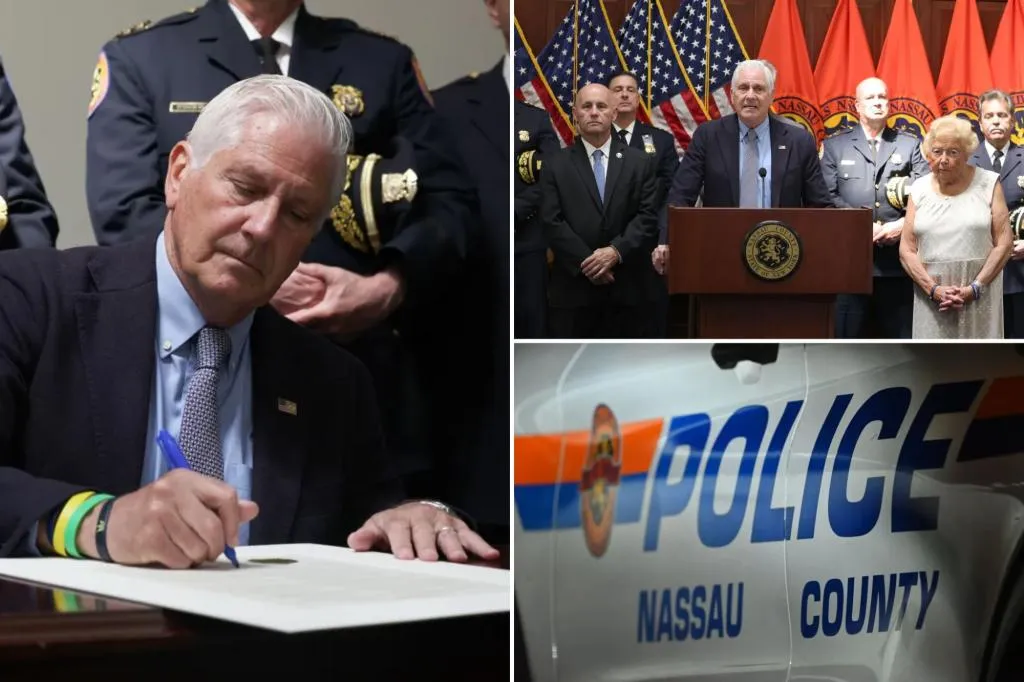Nassau County Policy Allows Officers to Wear Masks During ICE Raids and Undercover Work
Nassau County, NY – In a controversial yet significant move, Nassau County Executive Bruce Blakeman has signed an order permitting law enforcement officers, including those partnering with Immigration and Customs Enforcement (ICE), to wear face masks during their operations. The decision, made public earlier this week, has stirred up a mix of support and criticism, highlighting the ongoing debate over law enforcement’s role in immigration efforts and the balance of public safety and transparency.
Support for Law Enforcement
According to Blakeman, the primary goal of this new policy is to ensure the safety and efficiency of law enforcement personnel operating in high-risk environments. “We have their back,” stated Blakeman during a press conference addressing the new order. The use of masks, he explained, would protect officers working undercover or engaging in operations where their identities and safety could be compromised.
“The reality is that law enforcement faces numerous threats in the field, and anonymity can be crucial in certain operations, especially those affiliated with federal immigration enforcement,” Blakeman added.
Justifying the Need for Masks
Proponents of the policy assert that allowing officers to don face masks can enhance their ability to perform effectively in sensitive operations without exposing their identities or risking retaliation. Supporters argue that, particularly in the context of ICE raids, masks serve as a critical protective measure.
Moreover, with rising tensions surrounding immigration enforcement and the politicized nature of ICE operations, many officers may face hostility from the public when executing their duties. Masks would serve to provide them with a degree of anonymity, enabling them to focus on their tasks without fear of personal confrontation.
A Controversial Move
However, the decision to allow masks during ICE operations has drawn sharp criticism from immigrant rights advocates and civil liberties organizations. Critics argue that the anonymity granted by masks runs counter to efforts aimed at holding law enforcement accountable. They contend that masking officers enable abuses of power and can lead to an erosion of trust within immigrant communities.
“This order raises serious concerns about transparency and accountability,” said Maria Rodriguez, a spokesperson for the New York Coalition for Immigrant Rights. “A community needs to know who is serving and protecting them. Masks can potentially shield officers from holding them accountable for their actions.”
The Impact on Immigrant Communities
The implications of this policy extend far beyond law enforcement. Critics argue that masking officers during ICE raids may lead to increased fear within immigrant communities, heightening concerns about potential discrimination and abuse. In an environment where trust between immigrants and law enforcement is already strained, the use of masks can exacerbate fear and uncertainty among vulnerable populations.
“Immigrant communities must feel safe to report crimes and cooperate with local law enforcement,” said Dr. Julia Halperin, an expert in immigrant relations. “This policy could send a signal that law enforcement operates without transparency, ultimately alienating the very communities they seek to protect.”
Historical Context of Law Enforcement and ICE Relations
The relationship between local law enforcement and ICE has always been complex and fraught with tension, especially in light of ongoing debates about immigration policy in the United States. Over the past few years, numerous communities have sought to establish sanctuary policies, aiming to limit collaboration with federal immigration enforcement.
In the context of Nassau County, which has seen a diverse immigrant population, the decision to support ICE operations has sparked outrage among those advocating for immigrant rights. In 2020, numerous protests erupted against local enforcement partnering with ICE agents, creating rifts between immigrant communities and police departments.
Responses from Lawmakers
The recent policy decision has polarized many lawmakers in Nassau County. Some have rallied in support of the executive order, arguing that local law enforcement should have the resources they need to protect public safety. These supporters maintain that the policy represents a proactive approach to ensuring law enforcement can function in a secure and strategic manner.
Conversely, several local officials have expressed discontent with Blakeman’s decision. Councilwoman Laura Curran, responding to concerns from constituents, stated, “This policy gives the green light for officers to operate in shadows, undermining the very trust that is vital to a community’s safety.”
Broader Implications
The Nassau County policy could serve as a template for other municipalities wrestling with the implications of collaborative law enforcement efforts with ICE. As communities across the nation grapple with the challenges presented by immigration enforcement, mandates like this could spark further debates regarding police practices, transparency, and the rights of individuals in vulnerable populations.
As other jurisdictions observe the developments in Nassau, the policy may ignite changes in how law enforcement agencies throughout the country approach immigration enforcement and their collaboration with federal agencies.
Looking Ahead
In the face of ongoing protests and advocacy efforts from immigrant rights organizations, it remains to be seen whether Nassau County’s policy will provoke sufficient public outcry prompting a reversal of the order. As discussions continue, community responses are likely to shape the future of this directive, impacting how Nassau County and its law enforcement agencies engage with the public moving forward.
As the nation grapples with broader immigration issues, the conversation in Nassau County stands as a microcosm of the challenges that law enforcement and local governments face in addressing the needs and rights of diverse communities while attempting to maintain safety and security.
In conclusion, the recently signed order by Nassau County Executive Bruce Blakeman reinforces the ongoing tensions between law enforcement, immigration enforcement, and community relations. While supporters believe that the use of masks will enhance officer safety, critics assert that the decision could further alienate and endanger immigrant communities. The dualities of these reactions echo the broader narrative of immigration policy and the role of law enforcement in modern America.







